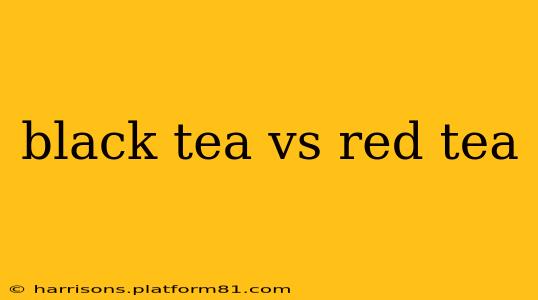Tea, a beloved beverage enjoyed globally, boasts a rich tapestry of varieties, each with unique characteristics. Among the most popular are black tea and what many call "red tea," which is actually Rooibos. While both offer distinct flavors and potential health benefits, understanding their differences is key to choosing the perfect cup. This comprehensive guide will delve into the nuances of black tea versus Rooibos (often mistakenly called "red tea"), clarifying their origins, processing, flavor profiles, and health advantages.
What is Black Tea?
Black tea, a fully oxidized tea, hails from the Camellia sinensis plant, the same plant that yields green, white, oolong, and other tea types. The crucial difference lies in the processing: black tea undergoes complete oxidation, resulting in its characteristic dark color and robust flavor. This oxidation process significantly impacts the tea's caffeine content and antioxidant profile.
Black Tea Flavor Profiles: A Diverse Range
The flavor profile of black tea is incredibly diverse, ranging from malty and earthy to fruity and floral. Factors influencing the taste include the tea's origin, the processing method, and the type of leaves used. Popular varieties include:
- English Breakfast: A full-bodied blend, often strong and robust.
- Earl Grey: A classic blend flavored with bergamot oil, offering a citrusy aroma and taste.
- Assam: Known for its malty and brisk character, often used in breakfast blends.
- Darjeeling: A lighter, more delicate tea with floral and muscatel notes.
What is Rooibos Tea (Often Called "Red Tea")?
Rooibos, or "red bush" tea, originates from South Africa and is distinctly different from black tea. It's derived from the Aspalathus linearis plant and isn't related to Camellia sinensis. Its unique processing—fermentation—gives it a reddish-brown hue and a naturally sweet, slightly earthy flavor. Crucially, Rooibos is naturally caffeine-free, making it a popular choice for those sensitive to caffeine.
Rooibos Tea Flavor Profiles: Sweet and Earthy
Rooibos offers a naturally sweet and subtly earthy taste profile. While the unflavored variety is popular, many variations are available, including those flavored with vanilla, cinnamon, or other spices. Its naturally sweet taste means it often requires less added sugar than black tea.
Black Tea vs. Red Tea (Rooibos): A Side-by-Side Comparison
| Feature | Black Tea | Rooibos Tea |
|---|---|---|
| Plant Origin | Camellia sinensis | Aspalathus linearis |
| Oxidation | Fully oxidized | Fermented (not oxidized) |
| Color | Dark brown/black | Reddish-brown |
| Caffeine | High | Naturally caffeine-free |
| Flavor | Diverse: Malty, earthy, fruity, floral | Sweet, slightly earthy, naturally caramel-like |
| Health Benefits | Antioxidants, potential cognitive benefits | Antioxidants, may aid digestion & relaxation |
What are the Health Benefits of Black Tea?
Black tea, like other teas, is rich in antioxidants, particularly flavonoids. These compounds are associated with various health benefits, including:
- Improved Heart Health: Some studies suggest black tea may help improve cardiovascular health.
- Brain Function: The caffeine and L-theanine in black tea may enhance cognitive function.
- Reduced Cancer Risk: Some research indicates potential links between black tea consumption and a reduced risk of certain cancers, though more research is needed.
What are the Health Benefits of Rooibos Tea?
Rooibos tea is also packed with antioxidants, and several potential health benefits are attributed to it:
- Improved Digestion: Some studies suggest it may ease digestive issues.
- Relaxation and Sleep: Its lack of caffeine makes it a calming beverage.
- Anti-inflammatory Properties: Rooibos contains compounds with potential anti-inflammatory effects.
Which Tea is Right for You?
The best choice between black tea and Rooibos depends entirely on individual preferences. Black tea offers a diverse range of flavors and a caffeine boost, while Rooibos provides a naturally sweet, caffeine-free alternative. Consider your caffeine tolerance, desired flavor profile, and potential health goals when making your decision. Experimenting with both is the best way to discover your personal favorite!
Frequently Asked Questions
Is red tea the same as black tea?
No, "red tea" is a common misnomer for Rooibos tea, which is not related to black tea and originates from a different plant entirely. Black tea is a type of tea derived from the Camellia sinensis plant, while Rooibos tea comes from the Aspalathus linearis plant. They have different processing methods, flavor profiles, and caffeine levels.
Which tea has more caffeine, black tea or red tea?
Black tea has significantly more caffeine than Rooibos tea. Rooibos is naturally caffeine-free.
Is black tea good for weight loss?
Some studies suggest that black tea may have a minor positive effect on weight management due to its caffeine content and potential metabolism-boosting properties. However, it's not a standalone weight-loss solution and should be part of a balanced diet and exercise plan.
Is Rooibos tea good for skin?
Rooibos tea is known for its antioxidant properties and is sometimes touted for its potential skin benefits, though more research is needed to confirm any specific effects.
Can I drink black tea every day?
Moderation is key with any beverage. While generally safe for daily consumption, excessive intake of black tea could lead to caffeine-related side effects like anxiety or sleep disturbances for some individuals.
This comprehensive guide provides a thorough overview of black tea versus Rooibos, empowering you to make informed choices based on your preferences and needs. Remember to consult with a healthcare professional before making significant dietary changes, especially if you have underlying health conditions.
